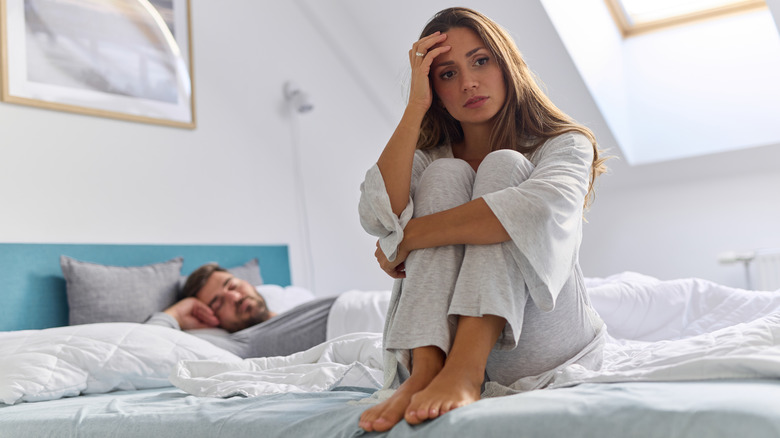This Vitamin Deficiency Can Have An Unexpected Effect On Your Sex Life
When the sun is out in the summer months, you generally feel happier, you're outdoors more often during the day, and your sex drive may also improve. Have you ever wondered why?
One of the reasons for a boost in libido might just be that you have more happy hormones circulating in your system thanks to the vitamin D you're getting from being in the sun. "People tend to assume that SAD (Seasonal Affective Disorder) is caused by the gloomy darkness of the short winter days, but in fact, those short days and more time indoors don't just mean darker skies; it also means you're getting less vitamin D, and therefore less dopamine and serotonin," explained Harvard-educated medical doctor, Dr. Sara Gottfried.
Your body goes through a complex process of using the sun's UVB rays to produce 7-Dehydrocholesterol which is then converted to vitamin D3, per Allo Health. When this vitamin D3 reaches your liver, it undergoes another change and becomes vitamin D. Serotonin, the neurotransmitter that is linked with regulating mood, increases when vitamin D is coursing through your system. Plus, dopamine function is impacted by vitamin D deficiency. When there's a disruption in how your pleasure and reward center functions, your sex life could suffer. There's also a more direct way in which not getting enough vitamin D can impact your activities in the bedroom.
Vitamin D deficiency can lead to low sex drive
Low sex drive, in both men and women, has been linked with vitamin D deficiency.
In men, a boost in testosterone levels is positively correlated with good sex drive. In women, low estrogen levels are connected to low libido. According to a 2010 study published in the journal Clinical Endocrinology, sufficient vitamin D levels were associated with higher levels of testosterone while the reverse effect was true as well. A 2018 study published in the journal Endokrynologia Polska found that taking vitamin D supplements increased sexual desire in women.
It's not just your sex drive that a lack of vitamin D affects. Vaginal health, fertility, and even erectile dysfunction are connected to vitamin D deficiency. Now that you know how important vitamin D is for your sex life, you may want to know about some of the unexpected causes of vitamin D deficiency, chief of which is not getting enough sun exposure. Your age, skin color, and underlying health conditions have a bearing too.
In relation to sunlight, we get it: It's confusing. We're asked to stay away from the sun to protect our skin from premature aging and cancer and we also need the sun to keep us happy in general and in the bedroom. What gives?
Here's how you should be getting your vitamin D
Experts agree that the big mistake you're probably making with vitamin D is thinking that you can get it from just one source. Sunlight exposure (whenever possible), your diet, and supplements can go hand-in-hand when it comes to getting this libido-boosting nutrient.
If you're going out in the sun, make sure you're wearing sunscreen and a hat if it's particularly hot outside. Sex life aside, your skin health matters too. Exercising outdoors for 10 to 30 minutes daily is a good way to get vitamin D. Including vitamin D-rich foods in your diet — like salmon, tuna, mackerel, dairy, fortified cereals, egg yolks, red meat, and liver — is good too. Supplementing is also an option. You can do a simple blood test to assess vitamin levels and discuss this option with your healthcare provider. This might become especially important during those cold and dark winter months when you're indoors a lot.
Most of us don't get the amount of vitamin D we need, although there is some debate as to exactly how much that is. While The Institute of Medicine has put that number at 600 international units (IU) per day for young adults and 800 IU daily for those over 70, the Endocrine Society recommends 1,500 to 2,000 IU of vitamin D, per Mayo Clinic. So you may want to speak with your doctor to ask their opinion about the best number for you. Either way, making sure you're getting enough vitamin D can combat the unexpected effect you don't want in your bedroom.



